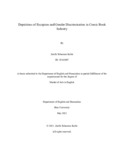Depictions of escapism and gender discrimination in comic book industry

View/
Date
2021-05Publisher
Brac UniversityAuthor
Kabir, Zarifa TabassumMetadata
Show full item recordAbstract
While television is one of the major sources of entertainment, a massive number of people also
entertain themselves by reading comic books. Comic book culture is rapidly becoming mainstream
as it includes comics, movies, TV shows, games, trading cards, toys and many more. On one hand,
we have the people who are working in the comic book industry and trying to come up with
adventurous yet relatable stories so that it can attract the mass. On the other hand, we have the
people who spend a lot of money buying comic books just to have the pleasure of temporary feeling
that life is not always monotonous and mundane, it is also full of exceptions and miracles which
ought to remove all negativities and violence of the world. This directly addresses consumerism.
Larger than life characters and magnetic storylines take them to the journey of a fantasy world,
where they forget the reality and get surrounded by the imaginative world.
In my dissertation I have stated that with the growing accessibility and popularity of comic books,
readers love to read it to see and feel the extravagant lives of the imagined superheroes, escape their
fear and frustrations of failure but they often discover depictions of gender discrimination and
hypersexualization in the comic books.This dissertation aims to target some of the most significant
and unavoidable factors of comic books.The first factor is escapism being the ultimate reason for
readers to enjoy comic books. The second unavoidable factor is comic books are financially
successful, despite producing childish contents which do not make any sense. The third important
factor to focus on is the pattern comic book creators use to touch the hearts of the readers. For
example, Marvel comics often use the pattern modeled after warriors and soldiers to give the readers the glimpse of safety and the power of standing up against injustice. Another important
factor is the political and commercial propaganda behind the comic books. From World War to
racial profiling, different comic books have displayed different agendas. To support its claim, it will
analyse postmodern writing techniques used in comic books to show the comic books focusing on
these techniques to create their contents. It will also look into the portrayal of the female characters
in the comic books with the factors such as, hypersexualization, gender discrimination, scopophilia
to point out a very visible yet less talked about topic which the patriarchal domination in the comic
book industry.
Description
This thesis report is submitted in partial fulfilment of the requirements for the degree of Masters of Arts in Teaching to Speakers of Other Languages, 2021.Department
Department of English and Humanities, Brac UniversityType
ThesisCollections
- Thesis, M.A. (English) [104]
